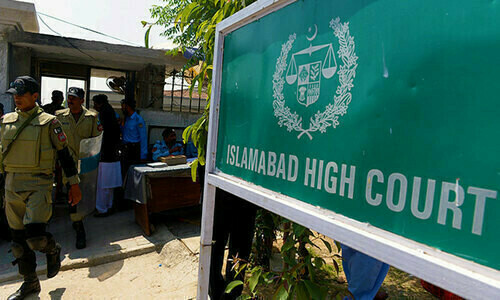BRUSSELS, April 18: Sectarian conflict in Pakistan is a “direct consequence of state policies of Islamization and marginalization of secular democratic forces,” says a report by the Brussels-based International Crisis Group. Co-option and patronage of religious parties by successive military governments have brought Pakistan to a point where religious extremism threatens to erode the foundations of the state and society.
Instead of empowering liberal, democratic voices, the report says, the government has co-opted the religious right and continues to rely on it to counter civilian opposition. “By depriving democratic forces of an even playing field and continuing to ignore the need for state policies that would encourage and indeed reflect the country’s religious diversity, the government has allowed religious extremist organizations and jihadi groups, and the madressah that provide them an endless stream of recruits, to flourish. It has failed to protect a vulnerable judiciary and equip its law-enforcement agencies with the tools they need to eliminate sectarian terrorism.”
Administrative and legal action against militant organizations has failed to dismantle a well-entrenched and widely spread terror infrastructure, the report asserts. Entitled ‘The State of Sectarianism in Pakistan’, it says banned extremist groups persist with new labels, although old names are also still in use. The ‘jihadi’ media is flourishing, and the leading figures of extremist organizations are free to preach their jihadi ideologies. Leaders of banned groups such as the Lashkar-i-Tayyaba, Sipah-i-Sahaba and Jaish-i-Mohammed “appear to enjoy virtual immunity from the law. They have gained new avenues to propagate their militant ideas since the chief patrons of jihad, the Jamiat Ulema-i-Islam (JUI) and the Jamaat-i-Islami (JI), have acquired prominent and powerful roles in Musharraf’s political structure.”
The report recommends the repeal of all laws, penal codes and official procedures that reinforce sectarian identities and cause discrimination on the basis of faith, such as the mandatory affirmation of religious creed in applications for jobs, passports and national identity cards; repeal of the Hudood laws and the blasphemy laws; the disbandment of privately-run Sharia courts in the NWFP; stopping of the use of zakat or other sources of government funding to finance the activities, educational or otherwise, of any sect; and to purge Islamic Studies textbooks of sectarian material that promotes or undermines specific sects.
It also asks the government to use the federal prerogative to veto the MMA’s Islamization agenda, including the Hasba Bill. The report urges the international community to press the Pakistan government to repeal discriminatory legislation that targets women and minorities.












































Dear visitor, the comments section is undergoing an overhaul and will return soon.